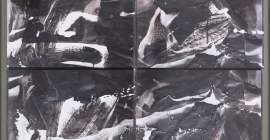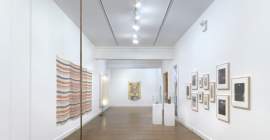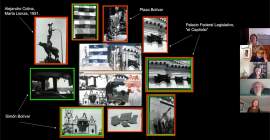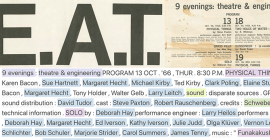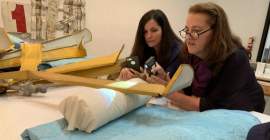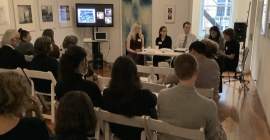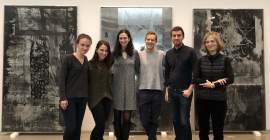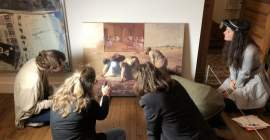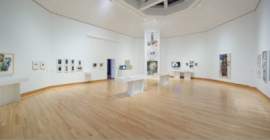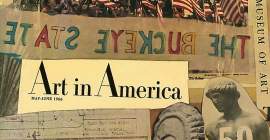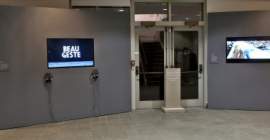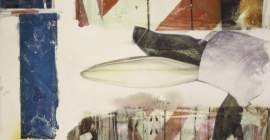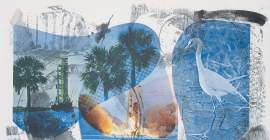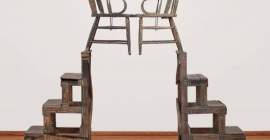In the collaborative spirit of the artist, the Robert Rauschenberg Foundation partners with institutions and organizations to increase public access to and scholarship on Rauschenberg’s artwork.
Collaborations
The Robert Rauschenberg Foundation collaborated with the MA Program in the History of Art at Hunter College, City University of New York, on a seminar focused on Rauschenberg’s early photography (1950–53) and later related artworks. As part of a curatorial practicum course led by Maria Antonella Pelizzari, Professor of Art History at Hunter College and the Graduate Center, CUNY, Hunter MA and MFA students curated An Archaeology in Time: Robert Rauschenberg’s Early Photography.
The Robert Rauschenberg Foundation collaborated with Branden W. Joseph, Frank Gallipoli Professor of Modern and Contemporary Art in the department of Art History and Archaeology at Columbia University. In conjunction with Joseph's lecture course on Neo Dada and Pop Art, he curated an installation of Robert Rauschenberg's artworks at the Foundation's headquarters.
The Robert Rauschenberg Foundation collaborated with the MA Program in Art History at Hunter College, City University of New York, on a seminar delving into the Rauschenberg Overseas Culture Interchange (ROCI, 1984–91) and its Latin American venues: Mexico, Chile, Venezuela, and Cuba. Led by Professor Maria Antonella Pelizzari, students were invited to engage with the complex layers of ROCI artworks through an analytical study of the artist’s camera work.
Since 2019, the Robert Rauschenberg Foundation Archives has collaborated with the Semantic Lab at Pratt Institute in a project focused on expanding access to archival materials related to Experiments in Art and Technology (E.A.T.).
The Robert Rauschenberg Foundation, Voices in Contemporary Art (VoCA), and the Winterthur/University of Delaware Program in Art Conservation (WUDPAC) launched a groundbreaking multi-year partnership which provides a new educational model for conservation in contemporary art, while addressing the specific needs of an artist endowed foundation.
The Robert Rauschenberg Foundation collaborated with the MA Program in Art History at Hunter College, City University of New York, on a Research Methods course taught by Michael Lobel, Professor of Art History. Exploring the photographic underpinnings of Rauschenberg’s work, student research focused on Rauschenberg’s black-and-white photographs, blueprints, and Hoarfrosts.
The Robert Rauschenberg Foundation collaborated with the Curatorial Certificate/MA Program in Art History at Hunter College, City University of New York. Led by Distinguished Professor Emily Braun, the Curatorial Practicum course resulted in Night Shades and Phantoms: An Exhibition of Works by Robert Rauschenberg mounted in the Spring of 2019 at the Foundation’s headquarters and an accompanying digital catalogue.
The Robert Rauschenberg Foundation collaborated with the MA Program in Art History at Hunter College, City University of New York, in conducting a Research Methods course taught by Emily Braun, Distinguished Professor. Each student produced comprehensive documentation and a detailed essay on an individual work by Rauschenberg in the Foundation’s holdings.
The Robert Rauschenberg Foundation collaborated with Williams College to build an art history course, Robert Rauschenberg: Art, Archives, and Exhibitions, around the artist and the Foundation’s archives and to develop the exhibition, Robert Rauschenberg: Autobiography, to highlight the students’ research.
The Robert Rauschenberg Foundation partnered with Art in America magazine to launch a pilot fellowship to support arts and culture writing in regions of the country that are often underrepresented in the media.
The Robert Rauschenberg Foundation partnered with Artsy to organize the Emerging Curator Competition, which elicited 138 submissions from five continents, thirteen countries, and seventy-eight cities. Nicole Bray developed her winning entry into the exhibition The ROCI Road to Peace: Experiments in the Unfamiliar, presented at the Academy Art Museum, Easton, Maryland in 2015–16.
The Robert Rauschenberg Foundation partnered with Artsy and the White House Historical Association to organize the “This Art Is Your Art” competition, which was an unprecedented opportunity for university students in the United States to engage with artwork in the White House.
The Robert Rauschenberg Foundation collaborated with guest curator James Merle Thomas for this exhibition featuring a selection of prints from the Stoned Moon series and the original drawings for the unrealized Stoned Moon Book, on loan from the Foundation’s collection. The presentation was part of the yearlong, university-wide interdisciplinary program “Imagining the Universe: Cosmology in Art and Science Initiative.”
The Robert Rauschenberg Foundation collaborated with curator and professor Kristine Stiles for this exhibition conceived over the course of a two-semester undergraduate seminar that she conducted at Duke University. Stiles led the students in developing an insightful career-spanning selection of Rauschenberg’s work from the artist’s personal collection (now in the trust of the Foundation) placed in dialogue with art from the Nasher Museum’s collection.

